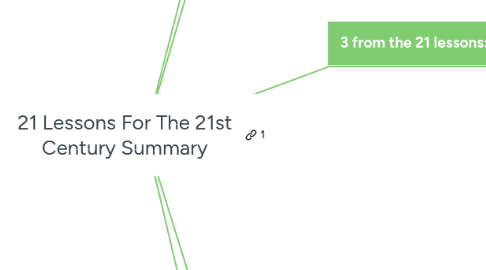
1. 1-Sentence-Summary:
1.1. 21 Lessons For The 21st Century highlights today’s most pressing political, cultural, and economic challenges created by technology while helping us prepare for an uncertain future.
2. Favorite quote from the author:
2.1. "In a world deluged by irrelevant information, clarity is power." - Yuval Noah Harari
3. 3 from the 21 lessons:
3.1. Whoever owns the data wins, which is why everyone struggles for it.
3.1.1. Different ideologies have always shaped how humans see and steer the world.
3.1.2. Depending on which ideology dominates, different assets grow in value. Whatever’s most valuable is the thing politicians and nations will fight for, thus deciding what future the world progresses towards.
3.1.3. So far, in the 21st century, technology seems to have all competitors beat. It’s the thing we most believe in.
3.1.4. With technology being our prime ideology, data becomes the most valuable asset. That’s why politicians struggle for their nations to win the giant tech race.
3.1.5. The problem is that this time around, no one fully understands the implications of our ideology.
3.1.5.1. Just look at the financial markets, where algorithms already do most of the work, with very few traders grasping what’s actually happening.
3.1.6. For politicians, this lack of understanding quickly becomes a threat.
3.1.6.1. People are frustrated, feel ignored, and realize the representatives they elected don’t deal with the most important topics.
3.1.6.2. And yet, we know just as little about technology as they do.
3.2. We don’t know, we just think we do – and that’s a problem.
3.2.1. We think we know a lot more than our ancestors when, actually, we know less in many regards. Harari calls this ‘the knowledge illusion.’
3.2.2. Instead, we should stay humble, be thankful, and do our best to never stop learning.
3.3. School needs to start teaching us how to think, not what to think.
3.3.1. Sadly, our schools only teach us the latter.
3.3.2. Even higher education still very much centers around cramming as many facts into your head as you can, only to spit them out once on a piece of paper, then forget them again. That’s a problem.
3.3.3. A basic understanding of history, biology, math, and other subjects is important, no doubt.
3.3.4. But beyond that, it’s more important that we learn how to navigate the modern sea of information, how to filter out the important, and how to determine what’s downright false, than just remembering more facts.
3.3.5. With more data being created now in a single year than the past few millennia combined, future workers won’t need to know as much as possible, but how to find out only that, which they really need to know.
3.3.5.1. For our kids to have a thriving future, that’s what we must teach them how to do.
